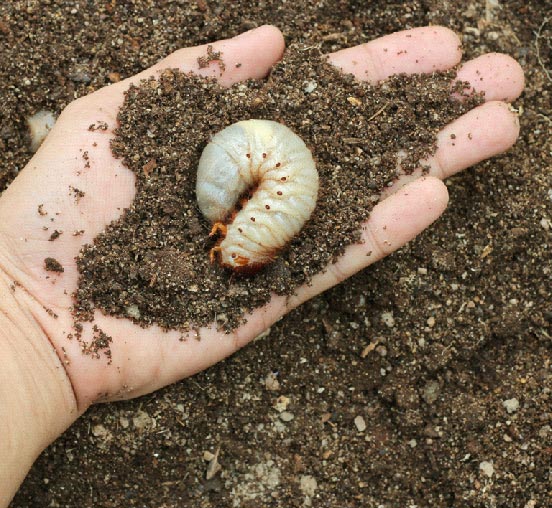Goodbye Grubs: A Simple Guide on Grubworm Control and Prevention
Just because you find a single grub doesn’t mean you have an infestation. All lawns will have some at some point or another. A healthy lawn will be resilient against a few here and there, but how do you know when you have enough for it to be a problem?
You can perform a small test to determine if action needs to be taken. Dig up a few small sections of your yard. If you find more than five grubs in a 1/4 square foot area of your lawn, then you should take actions to treat your lawn.
Grub Worm Prevention and Treatment
The old saying goes, “an ounce of prevention is worth a pound of cure.” The absolute best way to treat grubs is to prevent an infestation from happening in the first place. If you treat for grub worms before they are a problem, then you can spare your lawn and garden all the damage. Having preventive grub control applied in May or early June will protect your lawn all season.
The Grub Life Cycle
In the spring, grubs awaken from their winter slumber and begin feeding as they prepare to enter their pupae stage. As pupae, they metamorphosize into adult beetles. While in their pupae form, they are not eating and are resistant to the pesticides since it works by them ingesting it.
In the summer, the adult beetles emerge from their pupae and from the ground to feed on plants and mate. They then lay their eggs in the soil to begin the process all over again. Then, in the fall the eggs hatch into new grubs that immediately begin to feed before the winter freeze comes.
Grub-Control Treatment
A commercial pesticide treatment is the best way to prevent an infestation. Grub worms are most susceptible to treatments in the early-mid summer. When they are young is the best time to treat, killing the new grubs before they hunker down for the winter.
For the most comprehensive treatment, you can do one treatment in the spring and one in the fall to make sure the grubs are dealt with.
Encouraging the bird population in your yard can be a way to reduce your grub problem, though it is not a solution in itself. Many songbirds are natural predators of grubs and love to eat them, but won’t tear up your yard the way armadillos do. You can add a bird feeder to your yard to help attract birds who eat both seeds and bugs, but we still recommend chemical treatments for the most effective grub control.
Keep Your Lawn Green and Grub Free!
Don’t wait for grubs to damage your lawn to take action. Once the damage is done, it can be a lot harder to salvage your yard. If you let the infestation go and attract other pests to your yard, you will end up having to spend a lot more money to get things back to normal!
We are pros at treating for grub worm infestations, so give us a call today to schedule your treatment!

